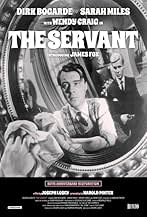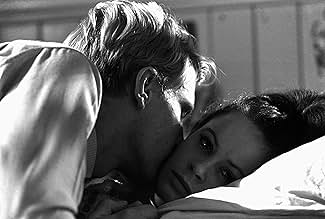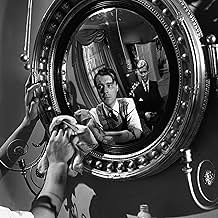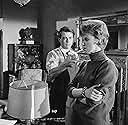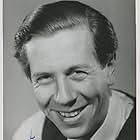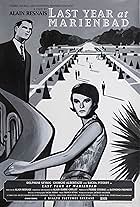Upper-class Tony hires servant Hugo Barrett, who turns out to have a hidden agenda.Upper-class Tony hires servant Hugo Barrett, who turns out to have a hidden agenda.Upper-class Tony hires servant Hugo Barrett, who turns out to have a hidden agenda.
- Won 3 BAFTA Awards
- 8 wins & 11 nominations total
Doris Nolan
- People in restaurant: Older Woman
- (as Doris Knox)
- Director
- Writers
- All cast & crew
- Production, box office & more at IMDbPro
Featured reviews
While this little known British classic has been badly neglected for the last thirty years or so, it shouldn't be; it is one of the most expertly realized portraits of British class warfare ever. Aside from Bogarde's (obviously) letter perfect portrayal of a sinister lower class valet with some ugly designs on his upper crust victim (well played also, by James Fox, who came to specialize in similar roles), one scene in particular stands out, and underlines beautifully the whole film's entire message. When Fox's aristocratic girlfriend (played by Wendy Craig) comes to visit, she has an amazing encounter with Bogarde. She suspects he's moving in on her boyfriend, ready to replace her in his affections. She imperiously orders him into the front room, abruptly quizzing him for his opinions on just about everything. She isn't concerned with his answers-she just enjoys ordering him around, Queen Victoria style. The effect is stunning-Bogarde clearly wants to strangle the bitch, but must restrain himself, he's only the servant after all. But he's still a man, and will get his revenge soon enough. The whole upper class system will be turned on its head. The resolution (if it can be called that) is not totally satisfying. In fact, it seems just as confused just and messy as life itself is.
Some reviewers have stated that Ms. Craig was miscast as the classy girlfriend. Not so-as she imperiously and hatefully orders the helpless servant around, her face and voice become a hateful mask of the arrogance and cruelty of British snobbery. A minor classic of its kind, somewhat dated, but still relevant and brilliantly filmed in moody black and white, and Bogarde's best moments on film.
Some reviewers have stated that Ms. Craig was miscast as the classy girlfriend. Not so-as she imperiously and hatefully orders the helpless servant around, her face and voice become a hateful mask of the arrogance and cruelty of British snobbery. A minor classic of its kind, somewhat dated, but still relevant and brilliantly filmed in moody black and white, and Bogarde's best moments on film.
"The Servant" was a film I had to think a lot about. Though I would not consider it as being flawless, it is a very interesting and indeed memorable piece of British cinema.
The characters itself could have been taken from P. G. Wodehouse's hilarious series of comic novels about the perfect butler Jeeves and his 'master' 'Bertie' Wooster, a young, superficial, and careless dandy who could not make one step without Jeeves constantly caring for him.
In "The Servant", a similar relationship is twisted in a much darker way: Hugo Barrett is not at all the faithful servant devoted to his master - though he appears to be at the beginning -, but a scheming, quite evil person who knows very well what he wants. (Though the real motives of his deeds do not become completely clear in the story - but this makes him probably even scarier.)
Dirk Bogarde was just wonderful. Most impressive. His body language, shifting from servile to casual, menacing or frivolous is meticulously developed and executed. The supporting actors were also good, notably James Fox. Sarah Miles tried everything to bring life to her rather cartoonish character, though she never could make me understand how Tony could be so sexually attracted to a woman like her in the first place.
I loved the homoerotic undertones of the Barrett-Tony relationship, especially in the second half of the film, after Barrett's return. They two men often act like a (gay) couple, especially in their disputes. There is also a great piece of dialogue between the two, written in tongue-in-cheek manner by Pinter, when they talk about feeling being "pals" and mention that they have felt like that "in the army before". The loveliest scene was the one where Barrett tells Tony that his "old flame" (Susan) has arrived and then says in a flirtatious manner "one yesterday - and one tonight" while holding Tony's face in his hand. We don't know yet at this point that he has invited some prostitutes, so this remark seems quite ambigous for a moment...
The symbolism is great, the many mirrors in the film forming a substitute for Barrett's gaze, never leaving Tony and Susan. There is also some phallic symbolism (most openly in the long shot of the garden just after the scene when Vera arrives at Tony's house). And Douglas Slocombe's black-and-white photography is just about incredible.
What I liked less about the film was that it was a weird mixture of what is basically a 19th century morality tale, but set in the 1960s and shot in the manner of the 1930s (the latter being no problem at all, but rather increasing the value of the film). The scenes with the women, especially the "erotic" scenes, were also rather awkward and very Sixties in style, so many of them seemed quite out of date, viewed today. The morality of the story was also quite flat in my opinion, and I must admit that I didn't care too much for Tony, this lazy and not very intelligent rich young dandy. In fact, I rather enjoyed Barrett catching the fly in his web...
The characters itself could have been taken from P. G. Wodehouse's hilarious series of comic novels about the perfect butler Jeeves and his 'master' 'Bertie' Wooster, a young, superficial, and careless dandy who could not make one step without Jeeves constantly caring for him.
In "The Servant", a similar relationship is twisted in a much darker way: Hugo Barrett is not at all the faithful servant devoted to his master - though he appears to be at the beginning -, but a scheming, quite evil person who knows very well what he wants. (Though the real motives of his deeds do not become completely clear in the story - but this makes him probably even scarier.)
Dirk Bogarde was just wonderful. Most impressive. His body language, shifting from servile to casual, menacing or frivolous is meticulously developed and executed. The supporting actors were also good, notably James Fox. Sarah Miles tried everything to bring life to her rather cartoonish character, though she never could make me understand how Tony could be so sexually attracted to a woman like her in the first place.
I loved the homoerotic undertones of the Barrett-Tony relationship, especially in the second half of the film, after Barrett's return. They two men often act like a (gay) couple, especially in their disputes. There is also a great piece of dialogue between the two, written in tongue-in-cheek manner by Pinter, when they talk about feeling being "pals" and mention that they have felt like that "in the army before". The loveliest scene was the one where Barrett tells Tony that his "old flame" (Susan) has arrived and then says in a flirtatious manner "one yesterday - and one tonight" while holding Tony's face in his hand. We don't know yet at this point that he has invited some prostitutes, so this remark seems quite ambigous for a moment...
The symbolism is great, the many mirrors in the film forming a substitute for Barrett's gaze, never leaving Tony and Susan. There is also some phallic symbolism (most openly in the long shot of the garden just after the scene when Vera arrives at Tony's house). And Douglas Slocombe's black-and-white photography is just about incredible.
What I liked less about the film was that it was a weird mixture of what is basically a 19th century morality tale, but set in the 1960s and shot in the manner of the 1930s (the latter being no problem at all, but rather increasing the value of the film). The scenes with the women, especially the "erotic" scenes, were also rather awkward and very Sixties in style, so many of them seemed quite out of date, viewed today. The morality of the story was also quite flat in my opinion, and I must admit that I didn't care too much for Tony, this lazy and not very intelligent rich young dandy. In fact, I rather enjoyed Barrett catching the fly in his web...
The song ' All Gone ' is played periodically through the duration of ' The Servant ' and it somehow sums the whole thing up. The period of the early sixties are long since gone, but the class divisions remain for better or worse ( mainly worse ) and in that sense the film is entirely relevant to today. I have seen this film only twice in my life, but giving myself a Joseph Losey ' season ' as they used to do, once upon the time, on the UK's BBC, but that too seems to be gone, reminds me of what we have lost in the cinema. Is it one of Losey's best films ? With certain reservations I think it is, and the merciless depiction of so-called ' order ' disintegrating into ' disorder ' sticks to the mind like glue. Except for a few exterior shots of Chelsea and a snow bound countryside the claustrophobia of the house in which the drama plays is palpable. You need air after watching this and to call it a drama is a bit of an overstatement. It is half way Harold Pinter and half way Samuel Beckett. Everything happens, and nothing happens, and the perennial Jean-Paul Sartre's ' Huis Clos ' and Harold Pinter's theatrical work in general, plus Samuel Beckett's ' Waiting for Godot ' come to mind. A closed universe without escape. Society's divisions of class and the trap of human life in itself are clearly visible. I am reluctant to give any spoilers except to say a manservant overwhelms the master of a house, and the temptations of losing control are too overwhelming for the master to resist. James Fox is excellent as the master, too passive to fight back and Dirk Bogarde gives arguably his best performance as a slightly camp manservant, and the obvious ( to me ) bisexuality between them also binds them together. Women are ' used ' in this scenario and to a certain extent Wendy Craig loses her righteous dignity and Sarah Miles as Bogarde's accomplice sinks further and further into self-degradation. It is perfect casting and Losey knew exactly what he was doing in choosing the actors. A party scene played as if it is in a mortuary appears dated, but looked at closely and listened to attentively it is entropy exemplified. A woman in black appears to hand out drugs to keep the master in a perpetual coma, and the other women in the room can barely move never mind indulge in any sexual acts. To sum up Losey sees a world collapsing into its inevitable oblivion. We the viewers watch, and despite having little background information about the characters we can draw own conclusions about what we are seeing, and like the people in the film gaze into mirrors as the only moorings to reflect our existence. A must see film but is its pessimism too hard to bear ?
If you watch closely you will find that not only does the internal decoration of the house change (in ways not included in the plot) to become gradually darker as Tony is gradually undermined and seduced by Barrett but also the excellent (but very much of its time) soundtrack by Johnny Dankworth & (surely - or is my recollection wrong?) Cleo Laine - though the same LP is put on the turntable many times, the arrangement of the same theme is different. (I did not notice this at first but found it pointed out in a special issue of the Oxford University magazine Isis at the time the film was released that was entirely devoted to it.) The film has recently reappeared in England as a stage work: Play without Words, seen at the National Theatre, is (was, I guess, is more accurate) a superb piece of dance theatre in which the ambiguities of the characters' motivations, or the discrepancies between their thoughts and actions, are portrayed by having more than one dancer per character. Sometimes only one is seen, sometimes they move in unison, sometimes in separate ways. It is extremely effective.
This is a superb, sinister movie of the very highest class. Unlike the character Tony (James Fox) who is upper class without being high class, if you get my drift. You cannot really sympathise with Tony, who toys with some high falutin' development projects but basically is a wastrel just waiting to be ponced off. Tony is a later-day Bertie Wooster. The sinister element comes from the servant (Dirk Bogarde), who is no Jeeves. Barrett, like Jeeves , is a gentleman's gentleman or valet (not a butler as suggested in some other comments on this film). Tony needs a valet because he is incapable of doing anything much without help. Barrett and his accomplice Vera (Sarah Miles) take Tony to the cleaners, sweeping aside the fiancee Susan (Wendy Craig) in their wake.
Harold Pinter has written the screenplay in similar vein to the superb movie The Accident, also a Losey piece, which I also commend. The cinematography in both movies is simply excellent. The subject matter of The Servant suits Pinter, although much of the screenplay is not really in Pinter's voice. However, there is one scene, set in a restaurant, which includes a tiny cameo by Pinter himself and which contains a short Pinteresque exchange between two women. There is also one tense exchange between Susan and Barrett "do you wear deodorant" etc. which is very reminiscent of a scene in The Caretaker "you stink from arsehole to Thursday" etc. Indeed the story of The Servant resembles The Caretaker in many respects, except that in The Servant the interloper, Barrett, is on top and stays there, whereas in The Caretaker the interloper, Davies, lacks the skill and circumstances to dislodge the incumbent.
There is a homoerotic undercurrent to the film and this works so well because it is an undercurrent (in 1963 there could have been no more than an undercurrent even if they had wanted more). The overt debauchery with Vera and the orgy party towards the end of the film is the only bit of the film that has aged without grace. But I quibble.
This is a truly great film and it deserves to be more widely known.
Harold Pinter has written the screenplay in similar vein to the superb movie The Accident, also a Losey piece, which I also commend. The cinematography in both movies is simply excellent. The subject matter of The Servant suits Pinter, although much of the screenplay is not really in Pinter's voice. However, there is one scene, set in a restaurant, which includes a tiny cameo by Pinter himself and which contains a short Pinteresque exchange between two women. There is also one tense exchange between Susan and Barrett "do you wear deodorant" etc. which is very reminiscent of a scene in The Caretaker "you stink from arsehole to Thursday" etc. Indeed the story of The Servant resembles The Caretaker in many respects, except that in The Servant the interloper, Barrett, is on top and stays there, whereas in The Caretaker the interloper, Davies, lacks the skill and circumstances to dislodge the incumbent.
There is a homoerotic undercurrent to the film and this works so well because it is an undercurrent (in 1963 there could have been no more than an undercurrent even if they had wanted more). The overt debauchery with Vera and the orgy party towards the end of the film is the only bit of the film that has aged without grace. But I quibble.
This is a truly great film and it deserves to be more widely known.
Did you know
- TriviaWhen producer and director Joseph Losey was hospitalized with a brutal case of pneumonia for two weeks during this shoot, Dirk Bogarde continued filming assisted by minute, daily instructions over the phone from Losey's hospital bed. When Losey returned to the set, he did not re-shoot any of the script, much to the relief of cast and crew. Bogarde managed to keep the film on schedule, though he later said the experience made him determined never to direct.
- GoofsWhen Tony and Susan arrive at Tony's house in the Mercedes, with an extended visit in mind, they both go into the house and Tony leaves the car's lights on.
- Quotes
Hugo Barrett: I'll tell you what I am. I'm a gentleman's gentleman, and you're no bloody GENTLEMAN!
- ConnectionsFeatured in Stairs (1986)
- How long is The Servant?Powered by Alexa
Details
Box office
- Gross US & Canada
- $45,522
- Opening weekend US & Canada
- $7,859
- Jul 28, 2013
- Gross worldwide
- $75,720
- Runtime1 hour 56 minutes
- Color
- Aspect ratio
- 1.66 : 1
Contribute to this page
Suggest an edit or add missing content



